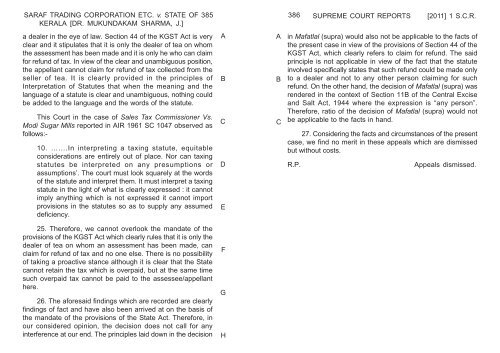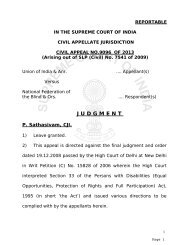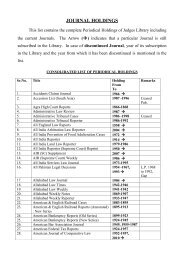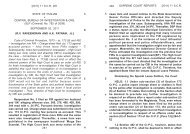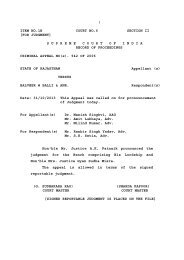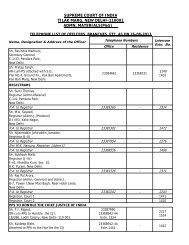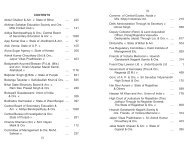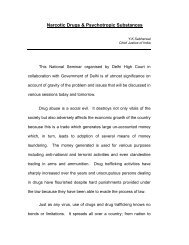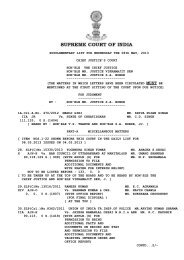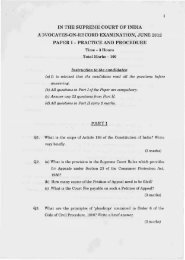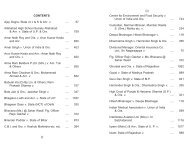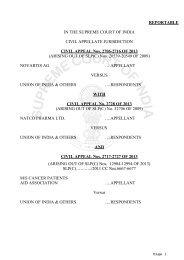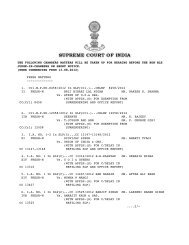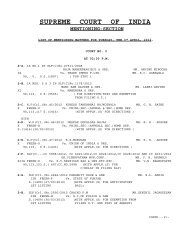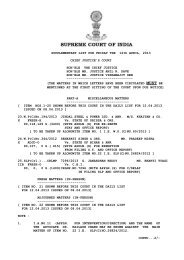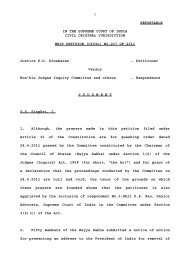Part No.II - Supreme Court of India
Part No.II - Supreme Court of India
Part No.II - Supreme Court of India
Create successful ePaper yourself
Turn your PDF publications into a flip-book with our unique Google optimized e-Paper software.
SARAF TRADING CORPORATION ETC. v. STATE OF<br />
KERALA [DR. MUKUNDAKAM SHARMA, J.]<br />
a dealer in the eye <strong>of</strong> law. Section 44 <strong>of</strong> the KGST Act is very<br />
clear and it stipulates that it is only the dealer <strong>of</strong> tea on whom<br />
the assessment has been made and it is only he who can claim<br />
for refund <strong>of</strong> tax. In view <strong>of</strong> the clear and unambiguous position,<br />
the appellant cannot claim for refund <strong>of</strong> tax collected from the<br />
seller <strong>of</strong> tea. It is clearly provided in the principles <strong>of</strong><br />
Interpretation <strong>of</strong> Statutes that when the meaning and the<br />
language <strong>of</strong> a statute is clear and unambiguous, nothing could<br />
be added to the language and the words <strong>of</strong> the statute.<br />
This <strong>Court</strong> in the case <strong>of</strong> Sales Tax Commissioner Vs.<br />
Modi Sugar Mills reported in AIR 1961 SC 1047 observed as<br />
follows:-<br />
10. …….In interpreting a taxing statute, equitable<br />
considerations are entirely out <strong>of</strong> place. <strong>No</strong>r can taxing<br />
statutes be interpreted on any presumptions or<br />
assumptions’. The court must look squarely at the words<br />
<strong>of</strong> the statute and interpret them. It must interpret a taxing<br />
statute in the light <strong>of</strong> what is clearly expressed : it cannot<br />
imply anything which is not expressed it cannot import<br />
provisions in the statutes so as to supply any assumed<br />
deficiency.<br />
25. Therefore, we cannot overlook the mandate <strong>of</strong> the<br />
provisions <strong>of</strong> the KGST Act which clearly rules that it is only the<br />
dealer <strong>of</strong> tea on whom an assessment has been made, can<br />
claim for refund <strong>of</strong> tax and no one else. There is no possibility<br />
<strong>of</strong> taking a proactive stance although it is clear that the State<br />
cannot retain the tax which is overpaid, but at the same time<br />
such overpaid tax cannot be paid to the assessee/appellant<br />
here.<br />
26. The aforesaid findings which are recorded are clearly<br />
findings <strong>of</strong> fact and have also been arrived at on the basis <strong>of</strong><br />
the mandate <strong>of</strong> the provisions <strong>of</strong> the State Act. Therefore, in<br />
our considered opinion, the decision does not call for any<br />
interference at our end. The principles laid down in the decision<br />
385 386<br />
A<br />
B<br />
C<br />
D<br />
E<br />
F<br />
G<br />
H<br />
A<br />
B<br />
C<br />
SUPREME COURT REPORTS [2011] 1 S.C.R.<br />
in Mafatlal (supra) would also not be applicable to the facts <strong>of</strong><br />
the present case in view <strong>of</strong> the provisions <strong>of</strong> Section 44 <strong>of</strong> the<br />
KGST Act, which clearly refers to claim for refund. The said<br />
principle is not applicable in view <strong>of</strong> the fact that the statute<br />
involved specifically states that such refund could be made only<br />
to a dealer and not to any other person claiming for such<br />
refund. On the other hand, the decision <strong>of</strong> Mafatlal (supra) was<br />
rendered in the context <strong>of</strong> Section 11B <strong>of</strong> the Central Excise<br />
and Salt Act, 1944 where the expression is “any person”.<br />
Therefore, ratio <strong>of</strong> the decision <strong>of</strong> Mafatlal (supra) would not<br />
be applicable to the facts in hand.<br />
27. Considering the facts and circumstances <strong>of</strong> the present<br />
case, we find no merit in these appeals which are dismissed<br />
but without costs.<br />
R.P. Appeals dismissed.


